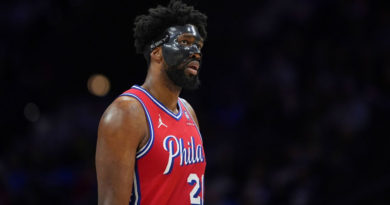How the Tigers have roared into playoff contention
Minutes before the MLB trade deadline in July, the Detroit Tigers shipped out their fourth player of the week and arguably the best to move across the entire sport when they dealt right-hander Jack Flaherty to the Los Angeles Dodgers. The Tigers proceeded to lose six of their next nine games. At 55-63 with barely a quarter of the season left, Detroit looked more or less like it has every year since Tarik Skubal joined the team in 2020: entirely forgettable.
Six weeks later, after securing another victory in a season that will end with him winning his first Cy Young Award, Skubal craned his neck in a half-moon to survey the Tigers’ clubhouse. He saw the members of MLB’s youngest everyday lineup and a patchwork pitching staff that has made the bullpen game into art. He was staring at a team that’s now tied for the American League’s final wild-card spot, a rise that has stunned the game — and even one of the people at the heart of the surge.
“It’s not traditional, and maybe not sustainable, but who cares?” Skubal said. “We need to win now.”
The Tigers own a 25-10 record since Aug. 11, the best in baseball, with a major league-leading plus-62 run differential. The Tigers are winning close games (10-2 in one-run games), they are winning road games (12-5) and they are playing the sort of baseball that manager A.J. Hinch, who knows a thing or two about young, ascendant cores, has been preaching all season.
Left for dead at the deadline, still doubted and dismissed as signs of life turned into much more, the Tigers start their most consequential series in a decade Friday night in Baltimore, where they’ll take on an Orioles team that like the other two current wild-card holders, the Kansas City Royals and Minnesota Twins, has spent recent weeks on the struggle bus. Everything has conspired to give Detroit a real path to ending the longest postseason drought in baseball with its first berth since 2014: three games at Camden Yards, three at home against Tampa Bay and a season-ending three-game home set against the worst team in baseball history, the Chicago White Sox.
“We’re young and all we want to do is win,” said outfielder Riley Greene, who at 23 years old is among the most tenured Tigers. “We’ll do whatever it takes.”
What it takes is simple: finishing at least one game ahead of Kansas City or Minnesota, which both own tiebreakers over Detroit as determined by head-to-head record. The Royals and Twins did their damage before this incarnation of the Tigers materialized and started running roughshod through the sport. Detroit’s sweep of Kansas City this week and Minnesota getting walked off in Cleveland on Wednesday and Thursday left the Tigers and Twins tied at 80-73.
On the surface, none of it makes sense. While their upside made the Tigers a sneaky potential contender in the AL entering the season, they cratered in June. The deadline exodus illustrated Detroit’s priorities: As many signs as they had shown, as many we-got-something-here flashes as they had produced, gone were Flaherty, outfielder Mark Canha, reliever Andrew Chafin and catcher Carson Kelly. Generally speaking, teams do not get rid of productive players and then find the best version of themselves.
“I said in July that I thought we were going to get younger and we were going to get better,” Hinch said. “And that was not a knock on anyone. We believed in our young players.”
The rescue operation in August happened with an infusion of youthful talent over the course of about a week. Two days after a one-run win against San Francisco on Aug. 11, Kerry Carpenter (27), their slugging right fielder who had missed nearly three months with a stress fracture in his back, returned. Three days after that, Detroit called up shortstop Trey Sweeney (24) — a player they received in the Flaherty deal — and third baseman Jace Jung (23), another top prospect. A day later, Greene returned from the IL and Spencer Torkelson (25), the 2020 No. 1 draft pick they had demoted, rejoined a lineup filled with other 20-somethings: second baseman Colt Keith (23), outfielders Wenceel Perez (24), Justyn-Henry Malloy (24) and leadoff-hitting center fielder Parker Meadows (24).
“Then we started just rolling from there,” said Matt Vierling, who at 27 is regarded as a veteran. “And it hasn’t really stopped. This is the first time this group of guys has really tasted this. And I feel like we’re just playing with house money. Almost no one thought we’d be here. What have we got to lose? Let’s just see how far we can take this thing and keep it going. It kind of reminds me of a couple of years ago.”
A couple years ago, Vierling was with a Philadelphia Phillies team that blitzed its way to the 2022 World Series on a wave of talent and vibes. He senses similar juju on this team, a function, he said, of how Hinch manages the roster. Tigers players know that Hinch is going to pinch hit based on matchups (they have the third-most pinch-hit appearances in MLB this year) and use his pitching staff more as out-getters than as traditional starters and relievers.
During their 35-game stretch with baseball’s top record, the Tigers’ starting pitcher has gone two or fewer innings 40% of the time. The only constants in the rotation have been Skubal — who is 17-4 with an AL-best 2.48 ERA and has struck out 221 and walked 34 over 185 innings — and rookie Keider Montero. With right-handers Casey Mize and Reese Olson returning to the rotation from the injured list in the past two weeks, Hinch has not needed to white-knuckle his bullpen decisions quite as much. It has become a simple operation: Whoever is best suited to succeed in a particular spot, you’re up.
“We’re not trying to reinvent the wheel,” Hinch said. “We’re just focused on strengths. How do we use what we have best? And we have a lot of pitching. We have arguably the best pitcher in baseball, and we have creativity where we’re trying to just maximize what we’re doing. I’ve been there, I’ve done this, I’ve seen this. We just have chipped away. We talk about winning series and winning weeks. We generally play good defense. We’ve got athleticism.”
That dynamic ability was front and center in the finale of the Kansas City series, from Meadows tracking down everything in Kauffman Stadium’s spacious center field to Jung’s acrobatic slide at home to avoid a tag on a play where the ball beat him home by at least 10 feet. “It was just a freak play,” Jung said. “If you told me to do it again 100 times, I probably could only do it a couple.”
At this point, that’s all they need. A lockdown pitching performance here. A clutch hit there. A wild slide. Most of the Tigers are too young to know any different. What they do know is that if they secure that final wild-card slot, it’s likely to set up a matchup with the American League West champion Houston Astros, a franchise with which Hinch managed an upstart group of talented young players once upon a time.
“We just play hard every single day,” Vierling said. “That’s how these guys are brought up. That’s how I was brought up. And we’re never out of it because of that.”



